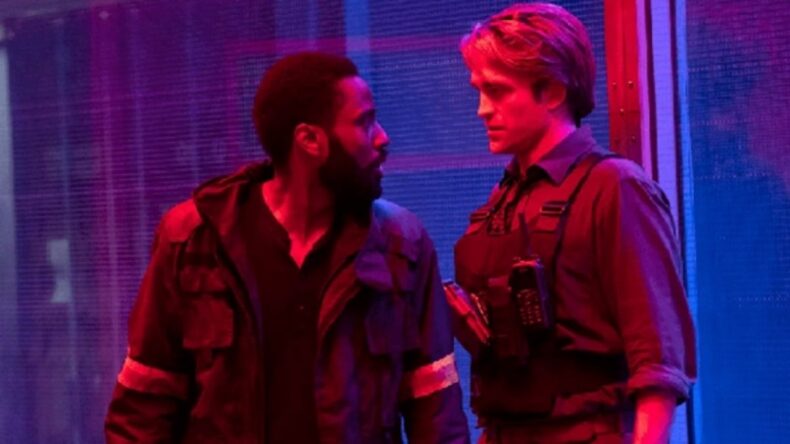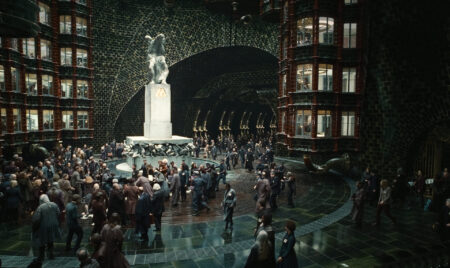The most impressive Tenet gets people simultaneously walking in opposite directions and cars seemingly in reverse in our timelines, which makes for one hell of a ride but not even a great car chase on screen.
The Protagonist (John David Washington) — yes, the central character is called just that in the film — participates in an undercover operation at a Kyiv opera house.
The procedure is shot to pieces, and he gets captured. He later commits suicide by chewing on a cyanide tablet. But he’s not dead.
The whole thing was a test of his loyalty, it seems. He’s partnered with his handler and partner Neil (Robert Pattinson) to go undercover again on a more dangerous mission.
It seems someone in the future has perfected a technology that reverses the entropy of objects.
For instance, a bullet fired can travel backwards in time — don’t ask us to explain the science behind this, please.
Somehow, the CIA has come to know about it and thinks it has the potential to end the world.
They want to prevent it from falling into the wrong hands. The protagonist gets first sent to India, where a Mumbai-based arms dealer, Priya (Dimple Kapadia), points him towards an even bigger fish, Russian arms dealer Andrei Sator (Kenneth Branagh).
Katherine “Kat” Barton (Elizabeth Debicki) is the estranged art dealer wife of Sator, and she’s used as a peg to get to him.
But things aren’t as upfront as they seem, and the protagonist has to employ all his wits and trust in luck to get the job done.
What unfolds is, essentially, Nolan’s version of a Cold War espionage thriller — less James Bond, more John le Carré.
Despite being significantly more prominent in scope, Tenet is tonally very similar to Tomas Alfredson’s Tinker Tailor Soldier Spy — a film that I, despite having watched twice, could not tell you the first thing about.
They even share the same cinematographer, Hoyte van Hoytema.
It requires an uncommon commitment from the audience. Unlike Inception, or even Dunkirk — unconventionally structured movies that took you along for the ride — Tenet, on several occasions, leaves you in the dust.
And then, to make matters worse, it criticizes you for not being able to keep up.
The two-and-a-half-hour film gets liberally peppered with such teasing nuggets that underline time’s reversibility as the protagonist, with Neil (Robert Pattinson) by his side, fights to save the world.
The duo zips from one picturesque location to another to crack the mystery behind the danger of extinction that lurks over humankind.
Their work takes them to Tallinn, the Amalfi coast, Mumbai, and Oslo. Like time, space is easily penetrable in Tenet.
Tenet, seen as a simple enough ‘superhero’ movie in which one invincible man swings into action when an arch-villain – here the man is Andrei Sator (Kenneth Branagh), a Russian oligarch in cahoots with destructive forces that are bent on wiping out the world with the help of technology that can reverse the entropy of objects and people – decides to go down with the world.
He is a man who has built his wealth by operating in and around his once-secret hometown of Stalks-12, an abandoned wasteland rendered worthless by a nuclear mishap. What he cannot have, Andrei Sator prefers to destroy.
But you cannot but dig deeper. Tenet is what it wants to be, no more, no less: a powerful drama crammed with befuddling concepts that are not limited to time travel alone.
The film takes in its sweep matters of the human consciousness and multiple realities; the ‘grandfather paradox’ (if you were to go back in time and kill your grandfather, you wouldn’t be born, Neil explains to The Protagonist); a nuclear device that has been split into nine algorithms to prevent it from being activated by unauthorized players; and the importance of instinct and free will in a world in which both are under threat.
Lead actor John David Washington carries the weight of the film on his shoulders without wilting. Robert Pattinson plays second fiddle without letting himself put in the shade. Dimple Kapadia, who has far less footage, makes an impact that is just as strong.
Kenneth Branagh articulates a mean streak with aplomb while the tall, statuesque Elizabeth Debicki does vulnerable and vixenish equally well.
Tenet is big, ballsy, and bedazzling: it enraptures even when it flummoxes. Undeniably, a grand tour de force. Nolan has made a James Bond film.
John David Washington is the straight-laced Daniel Craig kind of James Bond. Shaken and not stirred and without any sense of humour.
Like Bond films, Tenet deals with international conspiracies, end of the world scenarios, futuristic technology, and beautiful women caught in the wrong relationships.
Like Bond films, the hero has to rely more on himself than others to get the job done. Bond films are also known for their fantabulous action scenes.
Take it from us that you aren’t going to see a more significant action scene than the sight of a transport plane getting crashed on the runway.
Nolan reportedly used an actual plane to bring insane levels of reality to the film. The sight of Washington and Pattinson rappelling up and down Mumbai highrises will also bring forth a whoop of delight.
And the chase revolving cars going in reverse is delightful indeed. He hasn’t gone overboard with the new technology discussed in the film but has used it sparingly to give Nolan credit.
The climax scene is futuristic and looks straight out of a video game—full marks to the maverick director for providing us with some out-of-this-world action.













